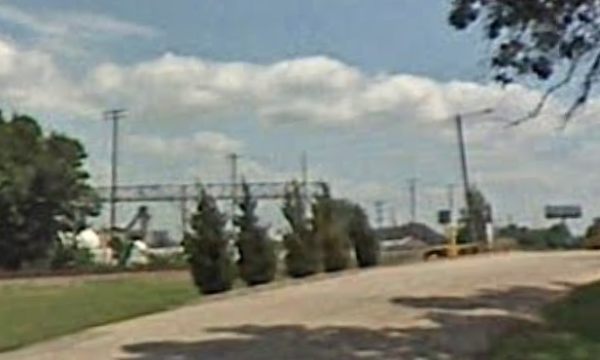
According to the Topeka Capital-Journal, Carl Anthony Myles, 67, of Topeka, lost his life after his cement truck was struck by an eastbound train just after 1 p.m. on Tuesday. The accident occurred at the intersection of 2350 N.W. Water Works Drive, situated just northeast of the junction between Interstate 70 and N.W. MacVicar Avenue, according to local authorities.
According to the Kansas Highway Patrol accident report, Myles was traveling northbound when his cement truck inadvertently entered the railroad tracks, leading to a fatal collision with the approaching train. The impact caused the truck to spin out of control, eventually landing on its passenger side and erupting into flames.
The resulting crash caused billowing smoke and flames that were visible from the surrounding area, sending shockwaves throughout Topeka. Gretchen Spiker, the communications director for Topeka's city government, described the scene as harrowing, with emergency responders rushing to the location to control the fire and assess the situation.
Tragically, Carl Anthony Myles succumbed to his injuries at the accident scene. He was the sole occupant of the cement truck during the incident, and fortunately, no one else was injured in the crash.
Authorities have launched an investigation into the circumstances that led to this fatal collision. As of now, the exact cause of the accident remains under scrutiny as law enforcement and relevant agencies work diligently to determine the sequence of events that led to this tragic outcome.

In the wake of a devastating train collision, questions arise about the legal options available to train accident victims and their families seeking justice. To shed light on the matter, we sit down with Reed Martens, Esq., a train accident attorney based in Kansas. With years of experience and a passion for advocating for accident victims, Mr. Martens provides valuable insights into the potential civil cases against liable parties and the compensation victims may pursue.
Editor Darla Medina (DM): Welcome, Mr. Martens.
Reed Martens (RM): Thank you, Darla. It's crucial that we inform the public about their legal rights when it comes to train accidents.
DM: Mr. Martens, could you please provide some insight into what train accident victims, or their families, can do in such circumstances to pursue a civil case?
RM: Certainly, Darla. In cases like this, where a train accident causes injury or loss of life, victims or their families may have grounds for a civil lawsuit against the parties deemed liable for the accident. This can include the train operator, the company operating the train, the owner of the tracks, or any other entity whose negligence may have contributed to the collision.
DM: I see. And what kind of compensation can victims or their families seek through such civil cases?
RM: The compensation sought in train accident cases can vary depending on the extent of the damages and the circumstances surrounding the accident. Victims or their families may seek compensation for medical expenses, funeral and burial costs, lost wages, pain and suffering, and other related damages. It's important to note that every case is unique, so it's best to consult with an experienced attorney to understand the full scope of potential compensation.
DM: That's valuable information, Mr. Martens. Now, when should victims or their families seek legal representation after a train accident?
RM: The sooner, the better, Darla. Time is of the essence in gathering evidence and conducting a thorough investigation into the accident. It's vital for victims or their families to contact a qualified train accident attorney as soon as possible to preserve evidence, identify liable parties, and build a strong case for just compensation.
DM: Wise advice, Mr. Martens. Lastly, can you tell us what qualities people should look for in a train accident attorney when seeking representation?
RM: Absolutely, Darla. When searching for a train accident attorney, experience, knowledge, and a track record of success in handling similar cases are paramount. Look for an attorney who understands the complexities of railroad regulations and has a history of advocating for the rights of accident victims. Additionally, empathy and a genuine concern for the well-being of their clients are essential traits to ensure victims receive the support and care they deserve during such challenging times.
 info@legalherald.com
info@legalherald.com